Utilisez-vous la fonctionnalité Publicize de Jetpack sur votre site ?
Récemment, en naviguant sur Facebook, nous avons trouvé plusieurs personnes partageant des liens où WordPress avait remplacé le nom de domaine du site. De plus, le statut indiquait ceci : Michelle Schulp a publié un article dans WordPress.
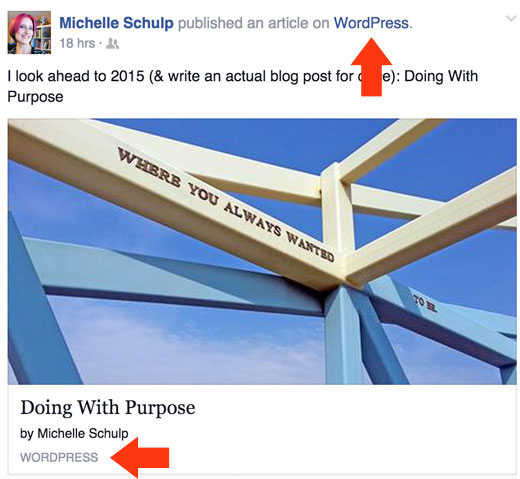
C'était alarmant, nous avons donc décidé d'enquêter sur le problème.
Lorsque vous cliquez sur le lien, il vous redirige vers le site Web. Cependant, lorsque vous cliquez sur WordPress, cela vous amène à une page d'inscription WordPress.com sur Facebook.
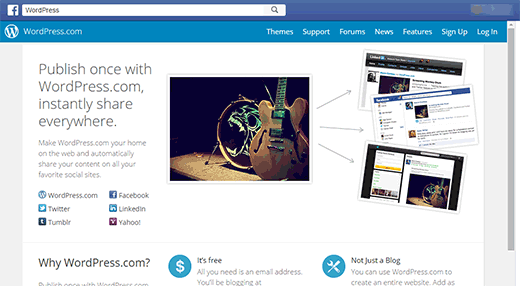
Nous avons examiné plus en détail pour voir si ces sites étaient hébergés sur WordPress.com, un service d'hébergement de blogs. La plupart d'entre eux ne l'étaient pas. (voir la différence entre WordPress.com gratuit et WordPress.org auto-hébergé)
Cependant, ils avaient tous une chose en commun. Ils utilisaient tous le plugin Jetpack, créé par Automattic, la société mère de WordPress.com.
Afin de vérifier nos conclusions, nous avons décidé d'installer Jetpack sur un site de test. Nous avons reproduit le problème, et il est lié à la fonctionnalité Publicize du plugin.
Lors de la configuration de la fonctionnalité Publicize, il vous est demandé de vous connecter à Facebook et d'autoriser plusieurs permissions.
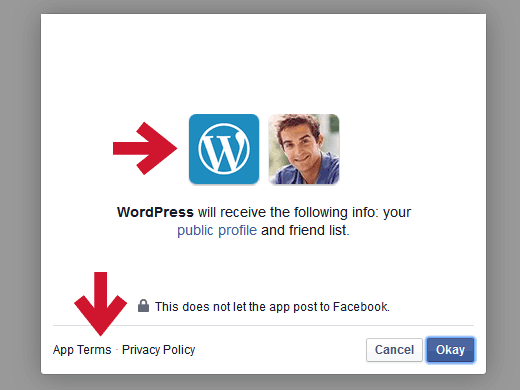
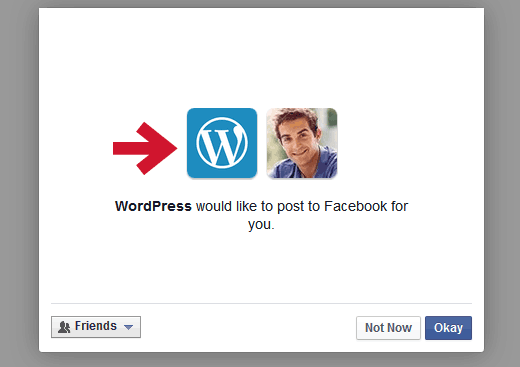
Pendant le processus d'autorisation, vous voyez le logo W bleu au lieu du logo W gris. Quelle est la différence ?
Eh bien, l'un est pour WordPress.com (le service d'hébergement de blogs) et l'autre est pour WordPress.org (le logiciel que nous aimons tous utiliser).
C'est déroutant, n'est-ce pas ?
Souvent, les débutants ne font pas la différence, ils pensent donc qu'ils autorisent réellement leur site WordPress, et non une plateforme tierce WordPress.com (voir les relations et les différences)
De plus, la formulation tout au long du processus ne précise pas que vous autorisez WordPress.com plutôt que votre site réel. Voir la capture d'écran de confirmation ci-dessous :
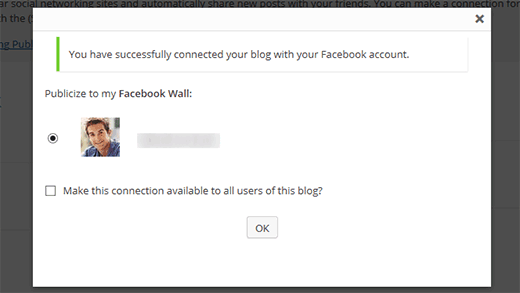
Maintenant, si vous voulez que Publicize fasse ce qu'il est censé faire (partager automatiquement votre article lorsqu'il est publié), voici ce que vos utilisateurs verront.
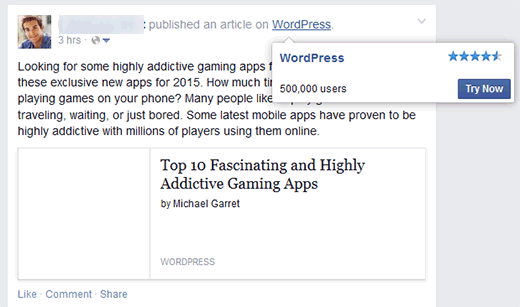
Nous avons effectué des recherches supplémentaires pour découvrir qu'il ne s'agit pas d'un nouveau problème. Il a été signalé plusieurs fois depuis 2013.
Étant donné que Jetpack est préinstallé et activé automatiquement sur plusieurs grands fournisseurs d'hébergement WordPress par défaut, cela devrait être corrigé pour réduire la confusion entre WordPress.com et WordPress.org auto-hébergé.
Bien que nous comprenions que Facebook ait ses limites, certaines choses peuvent et devraient être corrigées pour mieux informer les utilisateurs.
Premièrement, dans les données du lien sous le titre de l'article, il devrait en fait afficher le domaine de l'utilisateur pour promouvoir sa marque au lieu d'afficher WordPress. Comme Jeremy de l'équipe Jetpack l'a souligné dans les commentaires ci-dessous, ce n'est pas possible en raison des restrictions de Facebook.
Deuxièmement, la formulation qui dit que Syed Balkhi a publié un article sur WordPress devrait être reformulée pour dissiper la confusion.
L'un des utilisateurs qui a signalé le problème a proposé une suggestion de formulation : Vikas a partagé un lien via Publicize au lieu de dire que Vikas a publié un article sur WordPress.
Une autre alternative pourrait être : … a partagé un lien via JetPack car c'est ce qui se passe réellement.
Enfin, dans la boîte de dialogue de confirmation, il devrait être indiqué « vous avez connecté avec succès Jetpack à Facebook » ou « vous avez connecté avec succès votre compte Facebook à Jetpack ». [Mise à jour : Ticket #1476 créé par Jeremy]
Nous espérons que ces suggestions contribueront à améliorer l'expérience Jetpack Publicize pour les utilisateurs.
Jetpack est un excellent plugin pour les débutants qui migrent de WordPress.com vers WordPress.org car il vous permet de conserver de nombreuses fonctionnalités intéressantes de WordPress.com tout en vous offrant la puissance et la liberté de WordPress.org.
Remarque : L'objectif de cet article n'est pas de déclencher une guerre des mots, mais plutôt d'encourager la discussion et de partager notre opinion avec la communauté. Nous avons un immense respect et une grande appréciation pour Automattic et le travail qu'ils ont accompli.
Si cet article vous a plu, alors abonnez-vous à notre chaîne YouTube pour des tutoriels vidéo WordPress. Vous pouvez également nous trouver sur Twitter et Google+.






Moinuddin Waheed
J'ai utilisé le plugin Jetpack pendant longtemps depuis ses débuts (je ne l'utilise plus) et je n'ai jamais su que c'était l'entreprise, peut-être sa société mère Automattic, derrière WordPress.com.
Ils ont fait un travail formidable pour WordPress, bien sûr WordPress.org, et ont aidé d'énormes clients avec ses fonctionnalités intéressantes.
Merci wpbeginner de nous avoir montré comment aborder quelque chose d'aussi joliment sans les offenser.
inos
Salut messieurs les experts ! Je suis Inos. Je suis un vrai débutant en WP. Je suis en train de créer mon blog personnel. J'ai décidé d'avoir un hébergement personnel pour mon blog. Après quelques expériences sur WordPress.com, je suis très intéressé par certaines fonctionnalités héritées de WordPress.com, dont la capacité d'afficher mes articles de blog dans les lecteurs WP. J'ai installé Jetpack avec succès, mais je ne vois aucun de mes articles de blog apparaître dans le lecteur WP. Comment faire ? Merci..
Support WPBeginner
Salut Inos,
Si l'URL de votre site web a changé après avoir migré vers un site WordPress.org auto-hébergé, vos utilisateurs devront alors vous suivre à nouveau. Ils verront vos articles dans le lecteur sous Sites suivis.
Admin
Jay
Le mot wordpress est là car c'est l'application WP FB qui est utilisée, je ne pense pas que vous puissiez y faire grand-chose. S'il doit être remplacé par le titre du blog ou le titre du site, il doit y avoir un moyen de changer dynamiquement les paramètres de l'application. Je doute qu'il existe un tel moyen pour le moment
Sacha
C'est très sournois en effet !
J'utilise Jetpack pour certaines de ses meilleures fonctionnalités, mais je n'ai jamais aimé Publicize.
WP to Twitter est mieux.
Rozz
N'utilisez pas Jetpack. Utilisez des plugins bien écrits comme Next Scripts. Ils sont plus fiables et configurables.
Michele Pellegrino
Salut, ce commentaire est pour ROZ, je voulais juste te remercier d'avoir recommandé le plugin NextScript pour publier mon blog sur les plateformes de médias sociaux, au lieu de JetPack. NextScript avait du sens et m'a permis de spécifier la publication sur ma page Fan et NON sur ma page personnelle, et était très facilement configurable. Merci beaucoup, et un bien meilleur plugin !
Justin
Recommandez-vous un autre plugin que Jetpack pour publier des articles WP sur les réseaux sociaux ?
J'utilise Jetpack & je n'ai pas vraiment de problème avec la promotion de wordpress, mais on m'a dit que « Jetpack en particulier est un plugin très gonflé car il a beaucoup de fonctionnalités et de mini-plugins intégrés. Le code source de Jetpack est encore plus gros que le code de Wordpress. Si vous n'utilisez pas la majorité de ses fonctionnalités, il serait préférable de le désactiver et de le supprimer. »
J'utilise seulement Publicize et les icônes sociales sur chaque article de blog. Merci d'avance !
Asif2BD
Tout d'abord, @SyedBalkhi vous êtes encore passé à Disqus !
Récemment, JetPack revient toujours pour des choses négatives. C'est juste un sous-système riche en fonctionnalités (je ne l'appellerai pas un plugin), mais probablement trop dans un seul package.
John Nadeau
Forgive me but now I’m confused I have a WordPress.org site self-hosted at http://LeLacAppelle.com. I use (and love) JetPack to publicize my posts to Facebook Page. I don’t see any reference to WordPress.com in my Facebook Page Posts EXCEPT when I’m logged in as an admin/manager to my Facebook Page. Even then it only says “Posted by Wordpress” in gray and a note upon hovering over the question mark “only people that manage this page can see who posted”. Can you look at my Facebook Page at the first two most-recent posts and tell me if you see any reference to WordPress.com ? https://www.facebook.com/TheLakeIsCalling OH WAIT… I’m posting from my WordPress.org Site > JetPack > to a Facebook “PAGE”. Is that the difference? If I were to post to my own “Personal” Facebook Profile/Page, then would I see the behavior you speak of ?
I have a WordPress.org site self-hosted at http://LeLacAppelle.com. I use (and love) JetPack to publicize my posts to Facebook Page. I don’t see any reference to WordPress.com in my Facebook Page Posts EXCEPT when I’m logged in as an admin/manager to my Facebook Page. Even then it only says “Posted by Wordpress” in gray and a note upon hovering over the question mark “only people that manage this page can see who posted”. Can you look at my Facebook Page at the first two most-recent posts and tell me if you see any reference to WordPress.com ? https://www.facebook.com/TheLakeIsCalling OH WAIT… I’m posting from my WordPress.org Site > JetPack > to a Facebook “PAGE”. Is that the difference? If I were to post to my own “Personal” Facebook Profile/Page, then would I see the behavior you speak of ?
Syed Balkhi
Je ne vois pas non plus la publication dans WordPress, il est donc possible que ce soit uniquement pour les profils personnels par rapport aux pages, cela dit simplement qu'il a partagé un lien.
Jeremy
Oui, Facebook n'offre pas les mêmes fonctionnalités pour les pages. Les histoires personnalisées ne sont affichées que sur les chronologies personnelles.
Cameron Archibald
J'espère que ce problème Jetpack vs Facebook pourra être résolu. Mais je suppose que la meilleure façon de partager des articles ou des billets de blog est de le faire manuellement. Personne n'aime une machine de toute façon. J'ai aussi entendu dire que la publication manuelle par rapport à la publication automatique peut être découverte par Google de la même manière qu'elle peut l'être par les utilisateurs et que le jus SEO est distribué différemment.
Khürt L. Williams
«... la publication manuelle par rapport à la publication automatique peut être découverte par Google ». J'aimerais voir quelque chose pour étayer cela. Sérieusement, à moins que l'automatisation n'inclue une sorte d'identifiant, ce n'est pas possible. Je ne pense pas non plus que Google s'en soucie. Pourquoi le ferait-il ?
takien
Pas de problème pour moi.
ebarney
C'est une question un peu tangentielle, mais la fonctionnalité de publication n'est-elle pas un « partage implicite » via une application, selon l'algorithme de Facebook ?
Pour les pages que je gère, nous avons pris l'habitude de ne pas utiliser la publication via JetPack pour le contenu du blog après les changements de l'algorithme du printemps dernier qui minimisent le partage implicite via les applications (http://newsroom.fb.com/news/2014/05/news-feed-fyi-giving-people-more-control-over-when-they-share-from-apps/)
Copier manuellement les liens des articles et utiliser le débogueur de liens Facebook pour s'assurer qu'ils fonctionnent comme nous le souhaitons a le meilleur effet sur la visualisation réelle du contenu : https://developers.facebook.com/tools/debug/
Khürt L. Williams
Le lien newsroom.fb.com n'a pas fonctionné.
À quoi ressemble votre UL pour qu'il s'affiche différemment lorsqu'il est partagé via Jetpack par rapport à un copier-coller ?
ebarney
Je pense que j'ai fermé ma réponse précédente sans la poster, désolé
Collez ceci après l'URL de base newsroom.fb.com et voyez si cela fonctionne pour vous : /news/2014/05/news-feed-fyi-giving-people-more-control-over-when-they-share-from-apps/
Le partage via Jetpack est moins mis en avant dans les fils d'actualité de vos lecteurs par rapport à l'utilisation de la même URL et à sa copie manuelle dans la boîte « partager ceci » sur une page Facebook, c'est ce que fait le changement d'algorithme de FB, d'après ce que je peux en dire.
Pas un lien différent, juste un traitement différent du lien en fonction de l'endroit/la manière dont il est soumis au logiciel FB.
En parlant de l'algorithme FB et des pages, il y a beaucoup d'autres préoccupations pour les propriétaires de pages concernant la façon dont le contenu que vous partagez N'EST PAS vu – pas lié à Jetpack, mais des problèmes de contenu : http://newsroom.fb.com/news/2014/11/news-feed-fyi-reducing-overly-promotional-page-posts-in-news-feed/
Paul Ames
Excellente trouvaille, merci, je déteste Facebook de toute façon pour cette partie.
Alastair McDermott
Je vais être honnête, je pensais que c'était de l'auto-promotion pure et simple de la part des gens de WP.com. Mais comme d'habitude dans ces cas-là, il y a une autre option : ils utilisent une application commune pour faciliter le partage et ne pas compliquer les choses en demandant des clés. (Mes excuses pour avoir supposé le pire, les gens de Jetpack)
Ma préférence serait qu'ils documentent le comportement actuel de l'application pour être un peu plus transparents sur les choses, et qu'ils donnent la possibilité d'utiliser une application personnalisée alternative. Mais cela ajoute une fonctionnalité importante et je suppose que l'équipe Jetpack est assez stricte quant à toute ligne de code supplémentaire ajoutée pour lutter contre un potentiel gonflement.
Jeremy
Salut !
Je travaille pour Automattic, et je fais partie de l'équipe Jetpack.
Tout d'abord, merci pour vos commentaires !
Cela peut en effet être une question déroutante. Comme vous l'avez mentionné, Facebook a ses limites, ce qui rend les choses compliquées, voire impossibles, lorsque vous souhaitez personnaliser la sortie d'une mise à jour publiée depuis une application.
To use your own site name or brand there, you’d have to use your own Facebook app. Since Jetpack aims to help you easily push your content to multiple Social Networks, we won’t ask you to create a Facebook developer account, create an app, change the app settings, and copy app ID and secrets somewhere in your WordPress dashboard. That’d be the opposite of “easy”
Ce n'est pas quelque chose que vous pouvez changer, que vous utilisiez Jetpack ou toute autre application pour publier sur votre profil Facebook. Facebook lui-même crée la mise à jour et la phrase de partage en fonction des paramètres de l'application et des types d'objets. Vous pouvez en savoir plus à ce sujet ici :
https://developers.facebook.com/docs/opengraph/creating-custom-stories/
Ce serait en effet une option. Il disait en fait "WordPress.com" au lieu de "WordPress" par le passé. Nous l'avons changé en "WordPress" car les utilisateurs de Jetpack trouvaient déroutant de voir "WordPress.com" là.
Nous avons également envisagé d'autres options, dont « Jetpack ». Malheureusement, ce n'est pas possible avec la façon dont notre système est construit actuellement, car nous utilisons une seule application pour les sites WordPress.com et les sites Jetpack.
C'est toujours dans notre feuille de route, cependant ! Nous travaillons actuellement sur de nombreuses améliorations pour le module Publicize, et nous publierons ces changements bientôt dans une mise à jour que nous avons baptisée « Publicize Next ». Vous pouvez consulter quelques-unes des choses sur lesquelles nous travaillons ici :
https://github.com/Automattic/jetpack/milestones/Publicize%20Next
Je ne suis pas sûr de comprendre votre suggestion ici. Voulez-vous remplacer « votre blog » par « Jetpack » ?
Ils le feront ! Nous sommes toujours heureux d'itérer et d'améliorer les choses en fonction des commentaires des utilisateurs.
Si vous trouvez des bugs, vous pouvez également nous contacter directement ou créer un problème sur GitHub !
Syed Balkhi
Merci pour la réponse détaillée Jeremy. Je comprends les limitations techniques expliquant pourquoi un utilisateur ne peut pas changer le verbe « a publié un article sur WordPress »
Mon point est que vous (l'équipe Jetpack) pouvez, en tant que développeur d'application, représenter fidèlement l'action, et je suis heureux de voir que vous y travaillez déjà.
This confusion can be solved if Jetpack uses a separate Publicize app for .org sites rather than using the main WP.com app — this keeps the “easiness” entact for users
Quant à la boîte de dialogue de confirmation, elle indique actuellement que votre blog est maintenant connecté à Facebook. Cela implique une connexion directe, mais il y a un tiers impliqué (actuellement WordPress.com).
Je pense qu'un message de confirmation clair dirait : « Vous avez connecté avec succès votre compte Facebook à Jetpack »
Ce serait parfait si/quand il y aura une application autonome pour Jetpack.
Encore une fois, merci pour votre réponse et j'attends avec impatience la nouvelle version.
Jeremy
J'ai ajouté votre suggestion ici, et nous l'étudierons pour une future mise à jour de Jetpack :
https://github.com/Automattic/jetpack/pull/1476
Syed Balkhi
Thanks for your consideration Jeremy
George Stephanis
> This confusion can be solved if Jetpack uses a separate Publicize app for .org sites rather than using the main WP.com app — this keeps the “easiness” entact for users
Mais si nous le faisions, comment cela résoudrait-il votre affirmation selon laquelle nous « utilisons mal les marques des utilisateurs » pour promouvoir Jetpack ? Il s'agit simplement de changer le mot de WordPress à Jetpack, ce qui est encore plus lié à notre marque que le générique WordPress.
Syed Balkhi
George, avoir le nom de l'application sur le statut est un comportement naturel sur Facebook, je comprends cela.
Le problème qui crée de la confusion ici est le terme « WordPress » qui en existe deux. Le logiciel open-source, et la société d'hébergement WordPress.com
De plus, le choix des mots sur l'objet de l'action de votre application accentue la confusion :
« publié sur »
Si l'action dit publié sur WordPress.com (ne serait-ce pas une description inexacte de l'action car l'utilisateur ne le fait pas ?) — Tout comme dire publié sur WordPress tout en affichant l'application wp.com est également inexact.
Cela implique que l'utilisateur publie son article sur WordPress.com, ce qui est une déclaration trompeuse.
Si vous décrivez l'action avec précision :
XYZ a partagé un lien via Jetpack, alors vous ne trompez personne.
wycks
> That’d be the opposite of “easy”
D'ailleurs, j'utilise une application non-WordPress qui offre 2 options de publication à l'utilisateur.
Option 1 : Publication facile qui utilise les paramètres du plugin mentionnés ci-dessus.
Option 2 : Domaine personnalisé et paramètres de l'application, cela nécessite environ 5 minutes de travail et pour être honnête, il suffit de copier/coller les clés de l'application et de remplir au maximum 2 champs et d'enregistrer.
Vous devriez vraiment envisager d'offrir les deux options à votre utilisateur. Facile ne signifie pas ce que vous pensez et ne sert pas vraiment tous les utilisateurs.
Jeremy
C'est quelque chose que nous considérerons certainement lorsque nous travaillerons sur « Publicize Next », comme je l'ai mentionné ci-dessus. Si nous devions proposer cette option, nous devrions probablement la garder simple, afin d'éviter d'encombrer le tableau de bord avec plus d'options. Mais nous pouvons voir si nous pouvons fournir des filtres pour cela. J'ai créé un ticket pour suivre cette idée ici.
Keep in mind that all communication with Facebook is done via WordPress.com, though, so it makes things a bit more complicated for us as we’d have to build a new system to allow you to post from your site to your Facebook app without going through WordPress.com and our app. I’m not saying it’s impossible, but at that point, and since there are already plugins that do that well, it might be best to use one of these plugins instead. You don’t have to use each and every Jetpack module, it’s perfectly fine to deactivate a module and use something else when you need something different
« Facile » n'était peut-être pas la meilleure façon de décrire ce que j'avais en tête.
La façon dont Publicize fonctionne aujourd'hui est certainement plus rapide à configurer que si vous deviez créer votre propre application. C'est une solution clé en main, un peu comme la plupart des autres modules Jetpack.
You could get by by copying and pasting things around and following instructions, but you would also become responsible for your own app, and for keeping up with any changes Facebook may make to the system and the interface later on. It works, but it’s not for everyone.
Khürt L. Williams
Je pense que facile dans ce contexte concerne davantage la compréhension — facile à comprendre ou « Je n'ai aucune idée de ce qu'est une clé API Facebook ou comment en obtenir une. Donnez-moi le bouton facile ».
L'option 2 est du jargon de geek. Facile pour vous est un obstacle pour les autres.
Jeff Yablon
C'est... dérangeant, mais pas surprenant. C'est aussi une vieille nouvelle.
En parlant pragmatiquement, je peux défendre WordPress, de la même manière que je pourrais défendre Facebook lorsqu'ils inventent une adresse e-mail pour vous ou Disqus, le service qui traite ces commentaires, lorsqu'ils détournent votre jus SEO.
En parlant de manière un peu plus impitoyable, je peux dire quelque chose comme « ils vous donnent quelque chose gratuitement, et bien qu'ils aient probablement divulgué les politiques dans des conditions de service denses que ni vous ni personne d'autre n'avez jamais lues, ils ont divulgué, ... euh ... n'est-ce pas ? Alors assumez. »
Mais en toute honnêteté, j'ai peur que ma réaction revienne principalement à l'angle « pas surprenant ». Pas surpris qu'ils l'aient fait, et pas surpris que vous ne vous soyez pas arrêté pour considérer que cela allait se produire.
À la base, c'est ce dont il s'agit pour http://thewordpresshelpers.com. Et bien que dénoncer WordPress/Automattic, et al. ne soit pas le but, ce qui nous intéresse, c'est de dénoncer tout le monde pour tout; la communauté WordPress est sans doute plus grande et plus importante que Facebook ou toute autre nation numérique... et tous ses citoyens ont la responsabilité d'agir en tant que membres impliqués et informés de la communauté.